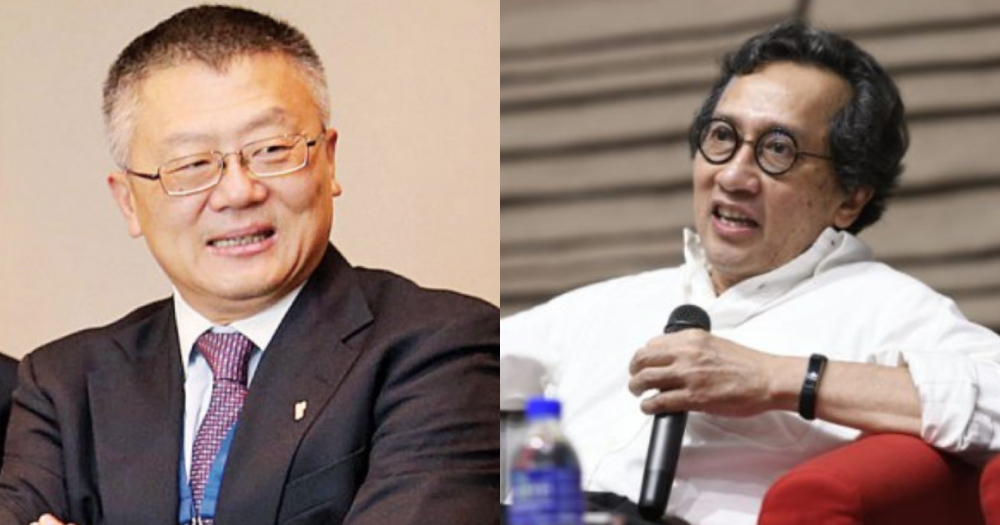Huang Jing has "never credibly explained" why Singapore deported him in 2017 if he is truly as innocent as he says he is, retired diplomat Bilahari Kausikan said in response to the China-born American academic.
Huang claims innocence
The former permanent secretary of Singapore's Foreign Affairs Ministry was responding to Mothership's queries on the comments Huang made in response to Bilahari's claims on Friday, July 25.
Huang has refuted Bilahari's claims that he was the Chinese "agent" who had recruited Yeo to spy for Beijing, demanding Bilahari retract the claims or prove them.
He told South China Morning Post (SCMP): “Singapore is a country known for its rule of law, what proof does he have?"
"I knew Bilahari when I was in Singapore and have no grudges against him. His comments against me are nonsense and unreasonable."
Before Bilahari's comments, it was not revealed if Huang was a foreign agent of China or the U.S.
Huang is now the dean of the Institute of International and Regional Studies at Beijing Language and Culture University.
Singapore not "some banana republic" that takes action against people carelessly
In response to Huang's comments, Bilahari said the academic had never credibly explained why Singapore took action against him "if not for the reasons" stated in the press statement released by the Ministry of Home Affairs back then on Aug. 4, 2017.
He said: "Why would the Singapore government accuse Huang of being an agent of influence, cancel his PR (permanent residence) status, require him to leave the country, and permanently ban him and his wife from visiting Singapore?"
Saying these are "very serious steps for the government to take", Bilahari continued: "Singapore is not some banana republic that carelessly or recklessly takes such serious actions without basis."
"Why would the government do so if he is lily-white innocent?" he said.
"Of course, he has denied wrong-doing, but what else can he say?"
"Surely he does not claim Singapore did all this merely on a whim or for no reason?" Bilahari added.
Back in 2017, Huang denied Singapore's allegations against him, dismissing them as "nonsense".
He said the Singapore government should "take [him] to court" if they have "evidence".
After getting deported from Singapore, Huang also said that he worked for a year in Washington D.C. in order to prove that he is "not what Singapore implied" he was.
Huang working in U.S. "proves nothing"
Bilahari then opined that Huang saying he went to the U.S. for some time to show that he was innocent is "a tacit admission that he may have been working for China".
This is because if Huang had been working for the U.S., going there would "prove nothing", he said.
"In fact, going to the U.S. does not prove he was not working for China either," he said.
Bilahari continued to say that Huang committed no offence against the U.S. as he was working against Singapore interests, not U.S. interests.
He pointed out that Huang soon left the U.S. and went to China, where he is now "employed in a senior academic position in Beijing".
He said: "Would he dare go to China if he had been working for the U.S. or Taiwan as some have claimed?"
Huang given senior academic job despite dual citizenship
Lastly, Bilahari placed the focus on Huang's dual citizenship.
He pointed out that China does not recognise dual nationality, and that Article 9 of China's nationality law says that if a Chinese citizen takes on a foreign citizenship, he or she loses Chinese citizenship.
He said: "As far as anybody knows, Huang suffered no penalty for holding dual citizenship. On the contrary, he secured a senior academic position."
Bilahari then said while many Chinese citizens secretly hold dual nationality, Huang was “a high-profile case" who "publicly boasted of having dual nationality”.
"It defies the imagination that the Chinese authorities would overlook such a high-profile case," he said.
Bilahari further claimed that it is not possible for Huang to secure a senior academic position without the agreement of the Chinese Communist Party (CCP).
In light of the current state of U.S.-China relations, he questioned whether Huang would be given a senior academic position without the system showing him "some special favour", especially since his other citizenship is American.
He said: "Is it credible that someone who holds dual nationality in defiance of Chinese law would be shown special favour unless he had done some special service to China?"
He added that Huang has not clarified if he still holds dual nationality.
Did not want to know Huang better when he was still in Singapore
When asked if he knew Huang well in the past, Bilahari said while they had met casually before, he never cared to pursue the acquaintance as the academic was "far too oleaginous for [his] taste".
But Huang later caught Bilahari's interest when the media reported on Huang's involvement in "a disgraceful case involving abuse of a taxi driver at the very doors of LKYSPP".
Bilahari said: "What I subsequently learnt about Huang did not make me any more eager to know him personally."
He was referring to an incident back in June 2016, when a video of Huang engaging in a heated dispute with a taxi driver emerged.
Huang had taken S$78 out of the S$79 the driver had passed him as change.
But he then allegedly berated the taxi driver and demanded the driver to show him some respect.
The driver eventually called the police.
Top image via Institute of Policy Studies, NUS
If you like what you read, follow us on Facebook, Instagram, Twitter and Telegram to get the latest updates.
